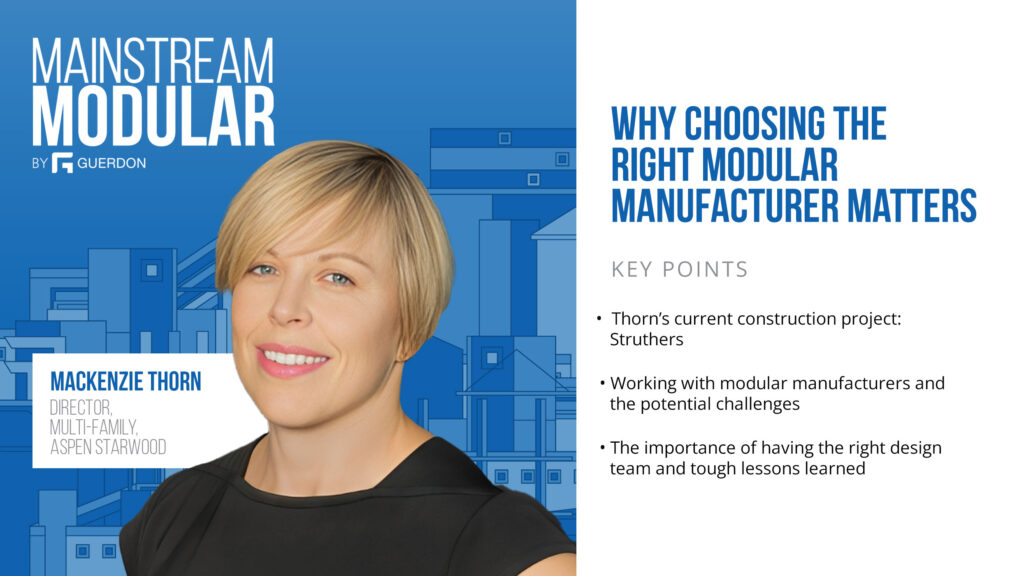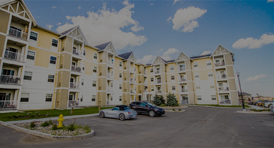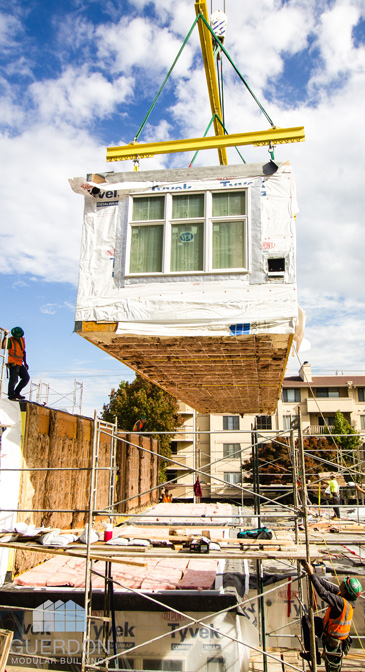
MAY 17, 2023 – Modular construction has been a very popular form of construction for hundreds of years now. Of course, in modern times, modular construction is very advanced even with several cons. But a simple fact remains for real estate and construction companies opting for modular: choosing the right modular manufacturers. In deciding on a modular manufacturer, these companies often must weigh certain components to ensure seamless projects.
Why is choosing the right modular manufacturer so important?
On the latest episode of Mainstream Modular, host Gabrielle Bejarano interviewed MacKenzie Thorn, Director of Multi-Family at Aspen Starwood, on construction projects, modular manufacturers and the varying industry standards.
In this episode, Bejarano and Thorn further explored…
- Thorn’s current construction project: Struthers
- Working with modular manufacturers and the potential challenges
- The importance of having the right design team and tough lessons learned
“There’s been big lessons learned with that experience. We have had a design team that in different areas were told that they had modular experience, and the lesson learned was hearing that they’ve done it and maybe seeing a picture, but actually sitting down with them discussing who they worked with, what factory they worked with, how they built it, and then talking to other developers, is a lesson learned from me about really digging in on, ‘Do they have that experience building modular?’ So, that was a key — will be a non-negotiable going forward as finding that pairing,” said Thorn.
She added that she seeks to partner with companies with readily available skills and tools. “And I think also having a modular manufacturer that has a strong design team in-house because the construction really has a lot of parameters around it, how the boxes are built, and only the factory can drive some of those parameters.”
MacKenzie Thorn is the Director of Multi-Family at Aspen Starwood. She is also the President of Aspen Dev Co., LLC. Having grown up a Lego enthusiast, Thorn found herself very interested in construction and real estate very early on. She attended the University of Denver and continued her graduate studies at NYU Schack Institute of Real Estate and New York University, respectively, where she received her Masters’ degrees.
 Mainstream Modular Spotify Podcast
Mainstream Modular Spotify Podcast  Mainstream Modular Apple Podcast
Mainstream Modular Apple Podcast
Pick The Right Team & Go Long
Transcript:
Gabrielle: Hello, everyone, and welcome to another episode of Mainstream Modular, a podcast brought to you by Guerdon. I’ll be your host for today, Gabrielle, and I’m so thrilled to be joined right now by MacKenzie Thorn, who’s a real estate developer at Aspen Starwood. Today’s topic is focused on how to find success with modular. So here to enlighten us on this subject, as well as provide any and all actionable industry insights is MacKenzie. So MacKenzie, welcome.
MacKenzie: Thank you, Gabby. Excited to be here.
Gabrielle: All right, so to start off, MacKenzie, let’s go ahead and give our audience just a brief bio on your name, title, what brought you to this industry and ultimately, Guerdon.
MacKenzie: Hi, Gabby. This is MacKenzie Thorn with Aspen Starwood, and I run the multifamily for Aspen Starwood. And I got my start at a young age with real estate and construction, most likely from my dad building LEGOs and then building a museum in my hometown of Cody, Wyoming. And I’ve been fortunate to work across the country on different asset types of construction and development. And all along, I’ve seen the idea of modular and seen the efficiency of kind of rinsing and repeating, building a box and doing it over again. And Guerdon fell into my lap. I joined Aspen Starwood and had a colleague who was interested in modular as I was. And we had the backing of our company to test it out and try it. And so we met with different manufacturers and ultimately went with Guerdon for a couple reasons, one primarily being the timeline, which is a key piece of modular is getting into the queue of modular. So it’s been a long time coming, and I’m excited for what it holds going forward, because I do think it’s the future of the industry. To some regard, it’s not for everyone. It’s not for one-offs, but apartments, hotels, I see that this is the way to go.
Gabrielle: Well, that’s so incredible how you started so young. I mean, it’s like almost in your blood that to where you are, where you are now. Well, just how, tell us about your current project right now, Struthers, and just how that came to be. I mean, it’s an incredible project, so we’d love to hear about it.
MacKenzie: So Struthers is near the river in Grand Junction, and it’s one of the very few multifamily being built in Grand Junction, which is a growing city in the Western slope of Colorado and great outdoors. And it was, like I said, kind of handed to me in the sense that it was designed to stick. And then luckily, my graduate school friend said, I want to try modular with this. And we had the support of some investors and the head of the company that said, yeah, why don’t we try this and see if we can make this work? Because the idea was we would build a 24-plex and a 36-plex and then replicate that model. And so we have a lot of land that we own. And so the idea was, let’s figure out how to build something that we can just then rinse and repeat, because there’s an efficiency in the design as well as in the construction of doing that. And so Struthers is our first project. It’s a smaller project. It’s only two buildings, 48 units. But it’s been a great test run, which goes to our kind of sister project, 656 Market, which is 72 units, which is also in construction. So the interesting thing about Struthers and Market is that they were in the factory at the same time. So it literally went from Struthers right to Market. And so there’s an efficiency in the sense that Market is 30, the box is 36. So it’s just expanded box that’s simplifying it, but an expanded box of Struthers. And so we were able to kind of take over Guerdon’s plants for a handful of months and just build the same thing efficiently.
Gabrielle: Well, I’m sure building a project at scale like this, I mean, it’s almost critical to have the right design team for this project and just others to have successful modular processes. So how critical is the right design team to a successful modular process? And how does one know if their team is ultimately up to par? What are some of the non-negotiable components?
MacKenzie: So there’s been a big lessons learned with that experience. We have had a design team that in different areas were told that they had modular experience and lesson learned was hearing that they’ve done it, maybe seeing a picture, but actually sitting down with them discussing who they worked with, what factory they worked with, how they built it, and then talking to other developers is a lessons learned for me about really digging in on, do they have that experience building modular? So that was a key non-negotiable. What will be a non-negotiable going forward is finding that pairing. And I think also having a modular manufacturer that has a strong design team in house because the construction really has a lot of parameters around it, how the boxes are built and only the factory can kind of drive some of those parameters. And so we’ve learned in this process of interviewing different modular manufacturers that different factories have different standards. And so getting the design team with the modular manufacturer at the very beginning is critical because the designer might create something that they’ve done with another modular manufacturer. And then this one says, no, that’s our factory is not physically set up that way. Like we just physically can’t even do that. And that just saves a lot of time and headache upfront. And so it really is a collaborative process up front that the architect is still at this point in our projects was the lead of it, but they have to work very collaboratively with Guerdon in this example. And obviously the structural, MEP, fire, all those teams really ideally have experience because when it’s your first one, you don’t have time to kind of work through all that because you’re already taking risk in that regard of just trying modular. So making the time up front to find the team that has experience and ideally a team that’s worked together and been successful together also huge value add.
Gabrielle: Well, it for sure is a learning process, as you said. And I mean, the right design team is critical, but there’s so many other critical things to plan for in the larger picture for modular success. So how does being prepped with the proper education factor into this? If you’re going to highlight that.
MacKenzie: So we hired a modular consultant, which was a value add for us. The cost to us was minimal for the scale of the project. And he really helped guide some of the, just even down to negotiation of the contract with the modular manufacturer. We’ve never built modular. So it was key to know what to even ask for, what to look for in the contract. So having some guidance and experience with somebody who’s been in the industry, works with all the different plants and kind of knows where the push and pull is on different projects was very helpful. And also just sitting and spending time with him to know what to get ahead of, because modular does require a lot of pre-planning. And that’s why a lot of people I think don’t do it as they think they want to do it. And they’re already so far down the design path to go back is cost. I mean, time for design and then time for delivery of your project. And so that knowledge sitting down and getting at least a broad stroke, because you can’t really know it all until you get into it is helpful to plan. And also having this modular consultant helped us a lot with the municipalities sitting down and educating them. Because that’s another new thing for a lot of areas is they’ve never had modular and they don’t know how to do it and how to inspect it, what they’re reviewing, what they’re not. And so having someone that helps kind of put some rails on helps guide that process. And ideally you have a municipality who is open to it and understands, because there’s plenty that are resistant to change in general. So having that pre-education, however, a lot of it is learning as you go.
Gabrielle: Oh, absolutely. Well, do you have any last thoughts to leave our audience just for some things that you should plan for in the larger picture for modular success?
MacKenzie: Yeah. So one key thing for us was having an experienced general contractor who had built modular before. They knew what they were facing because they had just done it on hundreds of units. And so having someone who also was involved early enough on in the design process to say, no, when we’re in the field actually installing that, that didn’t work very well that way. And so that was probably the most valuable piece was our general contractor who was able to come in with a knowledge base. And also they just were problem solvers because they’re willing to try new things. The key, one of the things about modular is that I feel that everyone’s in it to succeed because if the manufacturer, the design team, the GC, the owner, if modular doesn’t go well for any of us, then we’re going to go out there and say, well, I tried it and it didn’t work. And that’s just going to spread throughout the industry and people aren’t going to take that risk. So everyone is incentivized to be successful in the modular because then the design team can put it on their resume as I’ve done modular and the GC can put on their resume. I’ve done modular, it’s been successful. And so we’re all motivated and that’s a different experience than I’ve had with people versus kind of the same process of going through here. Everyone is very driven to make it a success for the project because that project helps them on their resume. And so also just some key things about modular that we’ve learned is having a place to put all your boxes. We luckily own other sites, but when I talk to other developers who are interested in modular, that’s one of the key things outside of having a strong design team and a GC is planning for space because we had 60 boxes for our 48 units that had to be placed somewhere and then you’re trucking them and moving them. And so that’s just one thing people logistically have to think about is, “where are we going to put the boxes”, and then also designing quickly. We had to redesign our electrical gear because the lead times are so long and modular’s so fast that it required an attention to those long lead times, much different than stick building because the project is going to be here. And so you don’t have much time to wait and go because then you lose that efficiency of modular.
Gabrielle: So MacKenzie, just what are some of the benefits you think of building a standard projects or repeatable projects?
MacKenzie: So we have had this design of the 24-plex and the 36-plex and so with that is an efficiency. So my design teams, since they have created this basic boxes already on every new project, I am negotiating a lower fee because not much has changed. And so I have a third project in design and it’s just the same 36-plex as our Market Street project, which is just expansion of the 24-plex. And so with that, I’ve decreased my design costs and then also I can increase to regard my execution of the project because we’ve been through so much of the work already that being able to open a project will go even faster than these last ones have, which these last ones have only been only taken a year, which is pretty impressive. So cost and time are huge benefits of creating a standard product that you can reuse over and over again.
Gabrielle: Well, thank you so much for sharing some of the major things to plan for in the larger picture for modular success. I mean, it all can’t go in one bucket. There’s so many factors that go into it, whether it be the design team, having an educational resource or so much more. So that wraps up the conversation for today. Thank you, MacKenzie, for joining us on today’s discussion of how to find success with modular. I mean, we learned a lot, so thank you.
MacKenzie: Thank you.
Gabrielle: Of course. And as always, if you’d like to learn more, please visit guerdonmodularbuildings.com and look for this podcast wherever it is you get your podcasts at. I’ve been your host, Gabrielle. Thanks for tuning in.
About Guerdon
Guerdon is the leading manufacturer of large-scale, commercial modular construction projects in the Western US and Canada. Guerdon’s modern, innovative modular technology combines on-site construction with precise off-site factory assembly line production. Traditional schedules are shortened substantially because modular units are constructed in our factory-controlled environment while site work and foundation construction are completed concurrently. Guerdon helps developers, architects and general contractors gain greater control over project quality, schedule, and the bottom line. Guerdon’s factory and corporate office are in Boise, Idaho serving 12 western states including California, Colorado, Idaho, Montana, Nevada, North Dakota, South Dakota, Oregon, Utah, Washington, Arizona and Wyoming as well as Canada.








